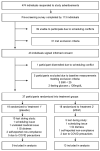The Effect of Daily Methylsulfonylmethane (MSM) Consumption on High-Density Lipoprotein Cholesterol in Healthy Overweight and Obese Adults: A Randomized Controlled Trial - PubMed (original) (raw)
Randomized Controlled Trial
. 2021 Oct 15;13(10):3620.
doi: 10.3390/nu13103620.
Affiliations
- PMID: 34684621
- PMCID: PMC8540167
- DOI: 10.3390/nu13103620
Randomized Controlled Trial
The Effect of Daily Methylsulfonylmethane (MSM) Consumption on High-Density Lipoprotein Cholesterol in Healthy Overweight and Obese Adults: A Randomized Controlled Trial
Lindsey Miller et al. Nutrients. 2021.
Abstract
Interventions to decrease inflammation and improve metabolic function hold promise for the prevention of obesity-related diseases. Methylsulfonylmethane (MSM) is a naturally occurring compound that demonstrates antioxidant and anti-inflammatory effects. Improvements in measures of metabolic health have been observed in mouse models of obesity and diabetes following MSM treatment. However, the effects of MSM on obesity-related diseases in humans have not been investigated. Therefore, the purpose of this investigation was to determine whether MSM supplementation improves cardiometabolic health, and markers of inflammation and oxidative status. A randomized, double-blind, placebo-controlled design was utilized with a total of 22 overweight or obese adults completing the study. Participants received either a placebo (white rice flour) or 3 g MSM daily for 16 weeks. Measurements occurred at baseline and after 4, 8, and 16 weeks. Outcome measures included fasting glucose, insulin, blood lipids, blood pressure, body composition, metabolic rate, and markers of inflammation and oxidative status. The primary finding of this work shows that high-density lipoprotein cholesterol was elevated at 8 and 16 weeks of daily MSM consumption compared to baseline, (p = 0.008, p = 0.013). Our findings indicate that MSM supplementation may improve the cholesterol profile by resulting in higher levels of high-density lipoprotein cholesterol.
Keywords: cardiometabolic; inflammation; methylsulfonylmethane; obesity; overweight.
Conflict of interest statement
The study was funded, in part, by Bergstrom Nutrition, manufacturer and provider of OptiMSM®. The funders took no role in the design of the study; in the collection, analyses, or interpretation of data; in the writing of the manuscript, or in the decision to publish the results.
Figures
Figure 1
Flow diagram of participant recruitment process. BMI, body mass index; MSM, methylsulfonylmethane.
Figure 2
Serum MSM concentrations were significantly elevated after 4 weeks of supplementation in the MSM group. MSM was undetectable in serum samples from placebo at each time point. * Indicates significantly different from baseline, p ≤ 0.001.
Figure 3
High-density lipoprotein cholesterol (HDL) was elevated at 8 and 16 weeks in the MSM group. (A) absolute values of HDL, (B) Differences from baseline. * Indicates different from baseline, p ≤ 0.05.
Figure 4
C-reactive protein (CRP) levels were lower in the MSM group compared to placebo at week 16. However, the placebo group showed increased CRP levels at week 8 and 16 compared to week 4. # Significantly different from week 4, p ≤ 0.05; ‡ significantly different from placebo group, p ≤ 0.05.
Similar articles
- Effects of Methylsulfonylmethane (MSM) on exercise-induced oxidative stress, muscle damage, and pain following a half-marathon: a double-blind, randomized, placebo-controlled trial.
Withee ED, Tippens KM, Dehen R, Tibbitts D, Hanes D, Zwickey H. Withee ED, et al. J Int Soc Sports Nutr. 2017 Jul 21;14:24. doi: 10.1186/s12970-017-0181-z. eCollection 2017. J Int Soc Sports Nutr. 2017. PMID: 28736511 Free PMC article. Clinical Trial. - Effect of chronic supplementation with methylsulfonylmethane on oxidative stress following acute exercise in untrained healthy men.
Nakhostin-Roohi B, Barmaki S, Khoshkhahesh F, Bohlooli S. Nakhostin-Roohi B, et al. J Pharm Pharmacol. 2011 Oct;63(10):1290-4. doi: 10.1111/j.2042-7158.2011.01314.x. Epub 2011 Aug 1. J Pharm Pharmacol. 2011. PMID: 21899544 Clinical Trial. - Methylsulfonylmethane (MSM), an organosulfur compound, is effective against obesity-induced metabolic disorders in mice.
Sousa-Lima I, Park SY, Chung M, Jung HJ, Kang MC, Gaspar JM, Seo JA, Macedo MP, Park KS, Mantzoros C, Lee SH, Kim YB. Sousa-Lima I, et al. Metabolism. 2016 Oct;65(10):1508-21. doi: 10.1016/j.metabol.2016.07.007. Epub 2016 Jul 20. Metabolism. 2016. PMID: 27621186 - Systematic review of the nutritional supplements dimethyl sulfoxide (DMSO) and methylsulfonylmethane (MSM) in the treatment of osteoarthritis.
Brien S, Prescott P, Bashir N, Lewith H, Lewith G. Brien S, et al. Osteoarthritis Cartilage. 2008 Nov;16(11):1277-88. doi: 10.1016/j.joca.2008.03.002. Epub 2008 Apr 15. Osteoarthritis Cartilage. 2008. PMID: 18417375 Review. - Methylsulfonylmethane: Applications and Safety of a Novel Dietary Supplement.
Butawan M, Benjamin RL, Bloomer RJ. Butawan M, et al. Nutrients. 2017 Mar 16;9(3):290. doi: 10.3390/nu9030290. Nutrients. 2017. PMID: 28300758 Free PMC article. Review.
Cited by
- Methylsulfonylmethane ameliorates metabolic-associated fatty liver disease by restoring autophagy flux via AMPK/mTOR/ULK1 signaling pathway.
Han D, Kim D, Kim H, Lee J, Lyu J, Kim JS, Shin J, Kim JS, Kim DK, Park HW. Han D, et al. Front Pharmacol. 2023 Nov 30;14:1302227. doi: 10.3389/fphar.2023.1302227. eCollection 2023. Front Pharmacol. 2023. PMID: 38099147 Free PMC article. - Searching for Metabolic Markers of Stroke in Human Plasma via NMR Analysis.
Oliveira N, Sousa A, Amaral AP, Graça G, Verde I. Oliveira N, et al. Int J Mol Sci. 2023 Nov 10;24(22):16173. doi: 10.3390/ijms242216173. Int J Mol Sci. 2023. PMID: 38003362 Free PMC article. - Methylsulfonylmethane Improves Knee Quality of Life in Participants with Mild Knee Pain: A Randomized, Double-Blind, Placebo-Controlled Trial.
Toguchi A, Noguchi N, Kanno T, Yamada A. Toguchi A, et al. Nutrients. 2023 Jun 30;15(13):2995. doi: 10.3390/nu15132995. Nutrients. 2023. PMID: 37447322 Free PMC article. Clinical Trial.
References
- Ogden C.L., Flegal K.M. Prevalence of Obesity Among Adults and Youth: United States, 2011–2014. NCHS Data Brief. 2015;131:1–8. - PubMed
Publication types
MeSH terms
Substances
LinkOut - more resources
Full Text Sources
Medical



